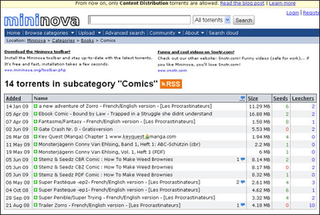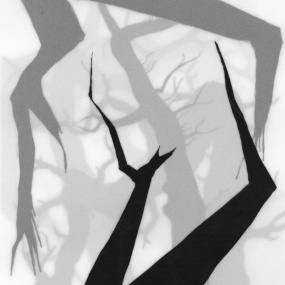BitTorrent, also referred to simply as torrent, is a communication protocol for peer-to-peer file sharing (P2P), which enables users to distribute data and electronic files over the Internet in a decentralized manner. The protocol is developed and maintained by Rainberry, Inc., and was first released in 2001.
Topsite is a term used by the warez scene to refer to underground, highly secretive, high-speed FTP servers used by release groups and couriers for distribution, storage and archiving of warez releases. Topsites have very high-bandwidth Internet connections, commonly supporting transfer speeds of hundreds to thousands of megabits per second; enough to transfer a full Blu-ray in seconds. Topsites also have very high storage capacity; a total of many terabytes is typical. Early on these warez sites were mainly distributing software such as games and applications after the release groups removed any protections. Now they are also a source of other copyright protected works such as movies and music. It is strictly prohibited for sites to charge for access to the content, due to decreased security, and sites found doing so are shunned by the topsite community.
MediaDefender, Inc. was a company that fought copyright infringement that offered services designed to prevent alleged copyright infringement using peer-to-peer distribution. They used unusual tactics such as flooding peer-to-peer networks with decoy files that tie up users' computers and bandwidth. MediaDefender was based in Los Angeles, California in the United States. As of March 2007, the company had approximately 60 employees and used 2,000 servers hosted in California with contracts for 9 Gbit/s of bandwidth.

The Pirate Bay, commonly abbreviated as TPB, is a freely searchable online index of movies, music, video games, pornography and software. Founded in 2003 by Swedish think tank Piratbyrån, The Pirate Bay facilitates the connection among users of the peer-to-peer torrent protocol, which are able to contribute to the site through the addition of magnet links. The Pirate Bay has consistently ranked as one of the most visited torrent websites in the world.
This is a timeline of events in the history of networked file sharing.

Mininova was a website offering BitTorrent downloads. Mininova was once one of the largest sites offering torrents of copyrighted material, but in November 2009, following legal action in the Dutch courts, the site operators deleted all torrent files uploaded by regular users including torrents that enabled users to download copyrighted material.

isoHunt was an online torrent files index and repository, where visitors could browse, search, download or upload torrents of various digital content of mostly entertainment nature. The website was taken down in October 2013 as a result of a legal action from the MPAA; by the end of October 2013 however, two sites with content presumably mirrored from isohunt.com were reported in media. One of them – isohunt.to – became a de facto replacement of the original site. It is not associated in any way with the old staff or owners of the site, and is to be understood as a separate continuation.
Rainberry, Inc., formerly known as BitTorrent, Inc., is an American company responsible for μTorrent and BitTorrent Mainline. The company was founded on September 22, 2004 by Bram Cohen and Ashwin Navin. It was successful during the Great Recession under the leadership of CEO Eric Klinker. In 2018, the company was acquired by cryptocurrency startup TRON, and Bram Cohen left the company. In March 2022, the SEC charged Rainberry with fraud for selling cryptocurrencies Tronix (TRX) and BitTorrent (BTT) as unregistered securities.

Vuze is a BitTorrent client used to transfer files via the BitTorrent protocol. Vuze is written in Java, and uses the Azureus Engine. In addition to downloading data linked to .torrent files, Azureus allows users to view, publish and share original DVD and HD quality video content. Content is presented through channels and categories containing TV shows, music videos, movies, video games, series and others.
The following is a general comparison of BitTorrent clients, which are computer programs designed for peer-to-peer file sharing using the BitTorrent protocol.

Oink's Pink Palace was a prominent BitTorrent tracker which operated from 2004 to 2007. Following a two-year investigation by the International Federation of the Phonographic Industry (IFPI) and the British Phonographic Industry (BPI), the site was shut down on 23 October 2007, by British and Dutch police agencies. These music industry organisations described OiNK as an "online pirate pre-release music club", whereas former users described it as one of the world's largest and most meticulously maintained online music repositories. About a month before the shut-down, music magazine Blender elected OiNK's creator, British software engineer Alan Ellis, to their The Powergeek 25 – the Most Influential People in Online Music list. Alan Ellis was tried for conspiracy to defraud at Teesside Crown Court, the first person in the UK to be prosecuted for illegal file-sharing, and found not guilty on 15 January 2010.

Demonoid is a BitTorrent tracker and website founded in 2003 to facilitate file-sharing related discussion and provide a searchable index of torrent files. The site underwent intermittent periods of extended downtime in its history due to the occasional need to move the server, generally caused by cancellation of ISP service due to local political pressure.

The use of the BitTorrent protocol for the unauthorized sharing of copyrighted content generated a variety of novel legal issues. While the technology and related platforms are legal in many jurisdictions, law enforcement and prosecutorial agencies are attempting to address this avenue of copyright infringement. Notably, the use of BitTorrent in connection with copyrighted material may make the issuers of the BitTorrent file, link or metadata liable as an infringing party under some copyright laws. Similarly, the use of BitTorrent to procure illegal materials could potentially create liability for end users as an accomplice.

TorrentFreak (TF) is a blog dedicated to reporting the latest news and trends on the BitTorrent protocol and file sharing, as well as on copyright infringement and digital rights.

Torrentz was a Finland-based metasearch engine for BitTorrent, run by an individual known as Flippy and founded on 24 July 2003. It indexed torrents from various major torrent websites and offered compilations of various trackers per torrent that were not necessarily present in the default .torrent file, so that when a tracker was down, other trackers could do the work. It was the second most popular torrent website in 2012.

aXXo is the Internet alias of an individual who released and standardized commercial film DVDs as free downloads on the Internet between 2005 and 2009. The files, which were usually new films, were popular among the file sharing community using peer-to-peer file sharing protocols such as BitTorrent. A download-tracking firm BigChampagne found — in a sampling period in late 2008 — that almost 33.5% of all movie downloads were aXXo torrents. aXXo encoded files to approximately 700 MB – the same size for a compact disc. Due to the re-encoded quality of an aXXo file, the suffix "aXXo" was often used by imitators.

"These Are My Twisted Words" is a song by the English rock band Radiohead. It was leaked via BitTorrent on 12 August 2009, possibly by the band, and released on 17 August as a free download from the Radiohead website.

Popcorn Time is a multi-platform, free software BitTorrent client that includes an integrated media player. The application provides a piracy-based alternative to subscription-based video streaming services such as Netflix. Popcorn Time uses sequential downloading to stream video listed by several torrent websites, and third-party trackers can also be added manually. The legality of the software depends on the jurisdiction.
ExtraTorrent was an online index of digital content of entertainment media and software. Until its shut down it was among the top 5 BitTorrent indexes in the world, where visitors could search, download and contribute magnet links and torrent files, which facilitate peer-to-peer file sharing among users of the BitTorrent protocol.

YIFY Torrents or YTS was a peer-to-peer release group known for distributing large numbers of movies as free downloads through BitTorrent. YIFY releases were characterised through their small file size, which attracted many downloaders.













